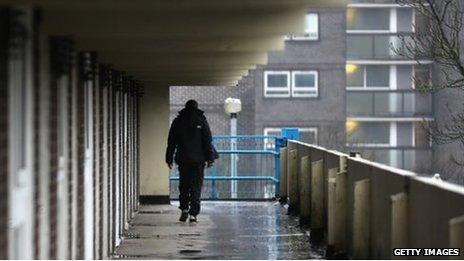Housing benefit changes 'unworkable'
- Published

The equivalent of 72,000 housing association tenants in England were in rent arrears because of the policy, the National Housing Federation said
Two thirds of housing association tenants affected by benefit cuts for those with extra bedrooms were behind with rent after six months, a National Housing Federation survey suggests.
And it said 38% were in debt because of the "unfair, unworkable" policy change - dubbed the "bedroom tax" by critics.
Research firm Ipsos-Mori surveyed 183 housing associations in England.
The government said it was "determined to support those who might need extra help through these necessary reforms".
'Heaping misery'
Since last April, people deemed to have one spare bedroom have had their housing benefit reduced by 14%, while those with two or more spare bedrooms have seen reductions of 25%.
The government argued the measure would help control the billions spent on housing benefit and free larger properties for those who needed them the most.
The National Housing Federation (NHF), which represents housing associations, said the changes were "heaping misery and hardship on already struggling families, pushing them into arrears".
Chief executive David Orr said: "Now many are at risk of being evicted because they simply can't find the extra money to pay their rent. These people have done nothing wrong."
He said the government had "suddenly changed the rules and given them a false choice - move to a smaller home or pay.
"Yet we know there aren't enough smaller homes in England for these families to move into."
Disabled
The NHF said the equivalent of 72,000 housing association tenants were in rent arrears because of the policy.
It said that, by last October, 15% of households affected by the cuts had received letters warning them they were in danger of being evicted.
And housing associations with affected tenants each spent an average of £73,250 before last April on measures such as welfare and financial advice services to mitigate the effect of the changes.
This would rise to an extra £109,000 on average by next month, the NHF estimated.
And it said that, according to its own research conducted since December, demand for discretionary housing payments - described by the government as providing "extra money when your council decides that you need extra help to meet your housing costs" - had tripled.
The NHF's Ruth Davison told BBC Radio 4's Today programme: "We know that 180,000 people are under-occupying two-bedroom homes, but last year only 85,000 one-bedroom properties became available.
"Two thirds of the people affected by this, by the government's own admission, are disabled."
'Coping well'
She raised the case of a man who cares for his "profoundly disabled" grandson in a purpose-built house. "They don't have a spare room," she said, "it's got his electric wheelchair in it, it's got his medical equipment in it.
"If they're forced to move to a smaller property, then that grandson is going to have to go into residential care at a cost of £5,000 a week.
"In what kind of world is it sense to save £14 and spend £5,000?"
But Edith Bald, a Conservative member of Milton Keynes council, told Today: "We've around 70 who have already moved. We've got a total of 260-odd looking to downsize on our home-swapping site.
"The signs are that people are coping pretty well."
A spokesperson for the Department for Work and Pensions (DWP) added: "We have tripled the extra funding given to councils this year to £190m - some of which is specifically targeted at disabled people - and have announced that £165m will be available for councils next year to help vulnerable tenants.
"There have been many scare stories about councils running out of funding when, in fact, only a quarter of local authorities across the country made a bid for the £20m funding available to top up their discretionary housing payment allocation, and a majority of councils spent less than half of their extra funding in the first half of the financial year."
Cuts mistakes
Meanwhile, Labour has accused the government of understating the number of council tenants who have had their payment wrongly docked under the policy.
Work and Pensions Secretary Iain Duncan Smith previously told MPs that up to 5,000 claimants affected should still have been entitled to have housing benefit calculated according to longstanding rules, despite the new regulations.
People who have been claiming housing benefit for the same property since before 1996 are thought to fall into this bracket.
Labour said data for local councils showed that at least 16,000 households in the UK had wrongly had benefits cut, and that the true figure could be closer to 50,000.
Shadow work and pensions minister Chris Bryant said: "This would be a farce if it weren't for the upset this has caused many vulnerable families and the huge cost to taxpayers."
But the DWP said regulations were being amended and it stood by its earlier estimate of "around 5,000".
- Published3 February 2014
- Published20 January 2014
- Published9 January 2014
- Published13 November 2013
- Published30 July 2013
- Published30 July 2013